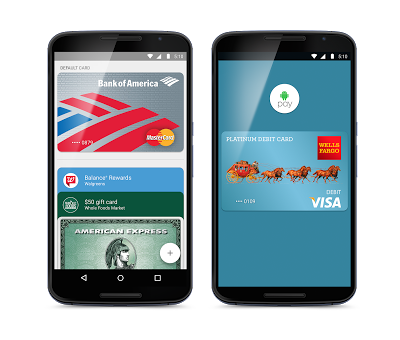Android Pay Already Supports 1 Million Stores, Rolling Out Now
Google announced that it has begun rolling out its mobile payments Android Pay service, which is already supported by over 1 million locations in the U.S.
The service should work on all Android 4.4+ NFC-enabled smartphones, as well as on all carriers. Previously there was a hold-up on Verizon, but that problem now appears to be fixed. Android Pay will also support credit and debit cards from all the four major credit card companies such as Visa, MasterCard, American Express and Discovery.
The banks and credit unions issuing the cards are the following: American Express, Bank of America, Discover, Navy Federal Credit Union, PNC, Regions Bank, USAA and U.S. Bank. Citi Bank, Capital One and Wells Fargo will also join the list soon.
Unlike Google Wallet, which didn't support tokenization but still supported some kind of "virtual numbers" that it used instead of the real credit card numbers when doing payments, Android Pay is apparently using the industry standard tokenization for security. It's still not clear if tokenization works the same as on Apple Pay, though, where the credit card numbers are shuffled often.
To store gift cards, loyalty cards and special offers, a longer-lived credit card number may be necessary, if that's how the merchants want to track you. However, all of those programs could also be somehow tied to your Google account or stored in some other way, but that would pretty much eliminate the privacy aspect that tokenization is supposed to offer in the first place.
No matter what you do, loyalty programs will likely always remain in conflict with the desire to keep your purchases private, so at least Google and others should offer the user the option to choose between the two.
Tokenization should still preserve its security benefit, even if you use loyalty cards, because if someone somehow intercepts the transaction or steals the transaction data from the merchant, your credit card number will remain safe.
Get Tom's Hardware's best news and in-depth reviews, straight to your inbox.
Google has also said that with every purchase, a confirmation dialog will pop-up, so you'll know at all times when your credit card was used. If your phone is stolen, you can also use Google's Device Manager to track it down and lock it. However, this app isn't default on Android devices, so Android users need to remember to install it (or a similar app).
Google Wallet, which has now been relegated to being a "peer to peer" money transferring application, will also support Android Pay through an update to the app. Other Android users will be able to download the Android Pay app over the next few days, and all new NFC-enabled smartphones coming to AT&T, T-Mobile and Verizon Wireless (Spring is missing for some reason) will have it pre-installed in the future.
Follow us @tomshardware, on Facebook and on Google+.
Lucian Armasu is a Contributing Writer for Tom's Hardware US. He covers software news and the issues surrounding privacy and security.
-
thundervore "Android Pay will also support credit and debit cards from all the four major credit card companies such as Visa, MasterCard, American Express and Discovery. "Reply
What is this Discovery card you speak of? Did you mean Discover? -
thundervore "NFC-enabled smartphones coming to AT&T, T-Mobile and Verizon Wireless (Spring is missing for some reason) will have it pre-installed in the future."Reply
Will it work without the "Spring"? or should I Sprint ahead to another carrier lol!! -
soccerplayer88 Reply"Android Pay will also support credit and debit cards from all the four major credit card companies such as Visa, MasterCard, American Express and Discovery. "
What is this Discovery card you speak of? Did you mean Discover?
Heh, you could even go as far as saying "What is this Discover card you speak of?"
I haven't seen someone use a Discover card in years. Pretty much everyone runs with Visa unless your a corporate entity. -
thundervore Reply"Android Pay will also support credit and debit cards from all the four major credit card companies such as Visa, MasterCard, American Express and Discovery. "
What is this Discovery card you speak of? Did you mean Discover?
Heh, you could even go as far as saying "What is this Discover card you speak of?"
I haven't seen someone use a Discover card in years. Pretty much everyone runs with Visa unless your a corporate entity.
This is 100% true. The only people I know that use Discover card are the ones still using AOL for their Email. Discover is card is becoming more and more hard to find a retailer that accepts it.
Amex is second up to as some retailers and most night bars will not accept it -
turkey3_scratch Reply16609380 said:This electronic money is getting really out of hand...
All money is electronic. Only a slim portion of the world's money is actually backed up physically in bills or gold. Our money is electronic. All your money in your bank account is just a number on a server - probably something like 5 decabytes. During the Great Depression, everyone went to pull their money out of the banks in fear of losing it, and people who didn't get first in line lost all their money because the banks ran out of physical money. At the time money was a number on a paper, but we've advanced to computers. -
JPWhite I used Discover Card quite a bit up until Sams Club started issuing their own Visa cards, then my use dropped to zero.Reply
At least Sam's Club were the first to start using chip-and-sign cards.

